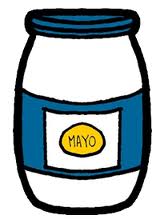Let’s settle this question once and for all: Is spelling really harder than reading? If a student can read a word, he should be able to spell it, right? This is a common question.
Help me with a short demonstration. Before continuing, take out a pen.
Try spelling these three words.
 Word #1: Write down the word that refers to the acrobatic move that children often do, rolling head over heels.
Word #1: Write down the word that refers to the acrobatic move that children often do, rolling head over heels.
Click to hear the word pronounced:
 Word #2: Write down the word that refers to the thick spread that we often put on sandwiches or in salads. Many people call it by its nickname, mayo.
Word #2: Write down the word that refers to the thick spread that we often put on sandwiches or in salads. Many people call it by its nickname, mayo.
Click to hear the word pronounced:
 Word #3: Write down the word that refers to a black solid shape of a person or object. This word can also refer to the likeness of a person cut from black paper and mounted on white paper.
Word #3: Write down the word that refers to a black solid shape of a person or object. This word can also refer to the likeness of a person cut from black paper and mounted on white paper.
Click to hear the word pronounced:
How did you do?
If you got all three right, congratulations! You’re a better than average speller. Most people surveyed misspelled these three words, even though they could easily read all three of them. If you want to give a similar test to people around you, try dictating the following words to someone in high school or above: counterfeit, mischievous, cantaloupe, cauliflower, paraphernalia, and entrepreneur. Very likely, your friends and family will find these words easy to read, yet challenging to spell.
So we’ve established that spelling is more difficult than reading. But why is that? Aren’t these skills two sides of the same coin? Well, yes—learning to spell and learning to read are based on much of the same knowledge, but spelling requires additional skills that are unique to spelling.
Spelling is more difficult than reading for three reasons:
Reason #1: Reading involves recognizing words, while spelling involves reproducing words.
Imagine going to a botanical garden. You are a casual gardener with a passing knowledge of plants. Your tour guide asks, “Which flower is a marigold? Which is a pansy? A zinnia?” You are able to point to each type of flower. But if your tour guide had asked you to name each of the flowers yourself, instead of asking you to merely recognize the plant, it would have been a more challenging task. Likewise, producing the spelling of a word is more difficult than recognizing a word.
Reason #2: There are more possible spellings for most words than there are possible ways to read them.
In English, we have 26 letters, but we have 45 sounds and more than 250 ways to spell these sounds. For example, the sound of /j/ can be spelled J, G, and DGE. And it gets even more complicated with vowels: the sound of long U can be spelled EW, O, UI, OU, OO, U_E, and UE in words such as dew, do, fruit, soup, loop, lube, and due. The sound of /sh/ can be spelled SH, CH, TI, CI, SSI, SI, C, T, and S. And so on.
Consider the word special. The reader can decode this word by going phonogram by phonogram and saying the most common sound for each phonogram. With a basic understanding of phonics, and recognizing CI as a phonogram that says /sh/, this word can be decoded without too much trouble.
On the flip side, the word special is not as easy to spell. There are multiple ways to encode the sounds of short E, /sh/, and /ul/. There are few guidelines to help narrow down which spelling to use, and the struggling speller has to go through the various options. After all, this word could be spelled spetial (same word ending as martial), speshul (exactly how it sounds), or spesial (same word ending as controversial). When a student is faced with several potential spellings for a single sound, the best he can do is visually recognize the correct spelling and practice, practice, practice. And this point leads us to…
Reason #3: Students spend much less time spelling than they do reading. Less practice time equals more difficulty.
Since sounds can be spelled in many different ways, students need ample practice, along with dependable spelling rules and patterns. In any given week, much more time is spent on teaching reading than teaching spelling. Even worse, spelling has been dropped from the curriculum at many schools across the nation, leaving kids to their own devices. That lack of practice—combined with the added complexity inherent in spelling—adds up to many struggling spellers.
At All About Learning Press, we understand why spelling is more difficult to learn than reading, and we have dozens of research-based strategies to help your student shine in spelling!



